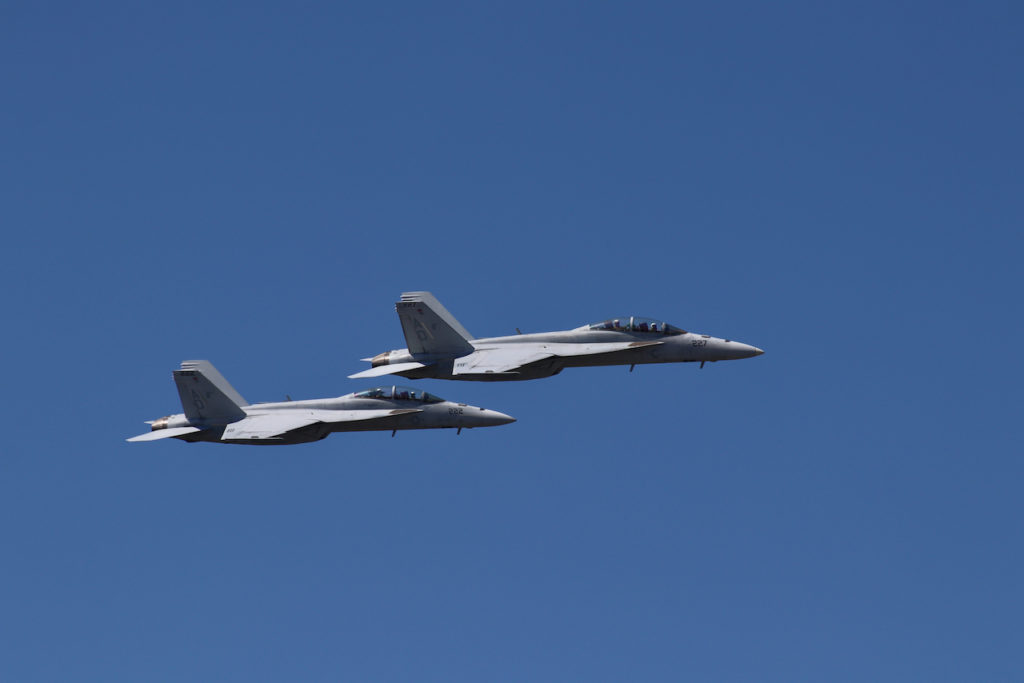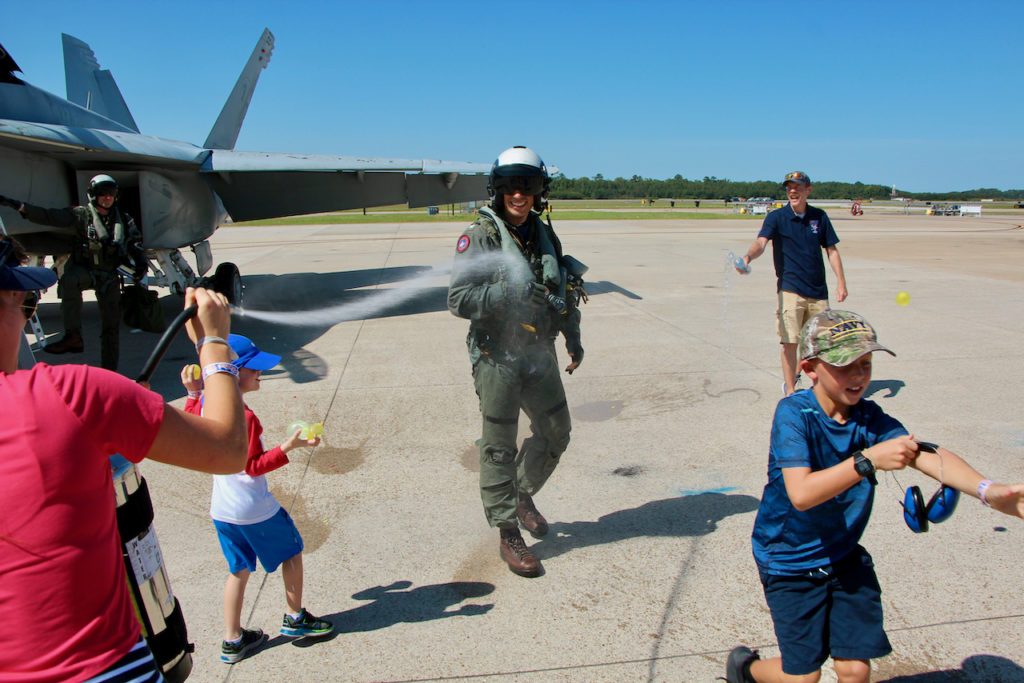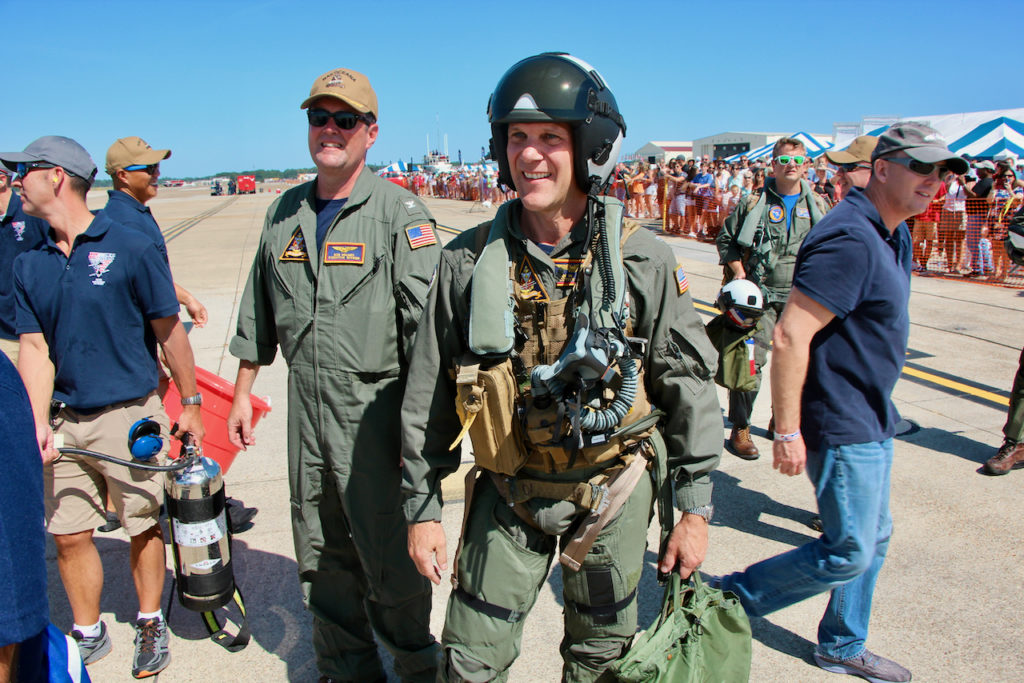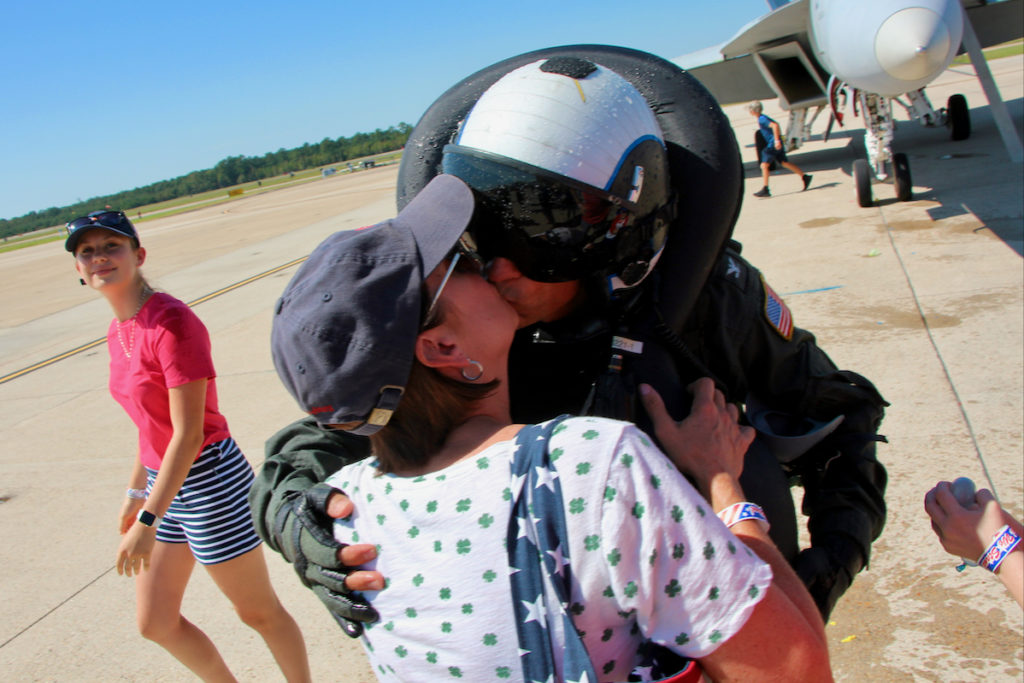
OCEANA — U.S. Navy Capt. John Hewitt relieved Capt. Chad Vincelette as commanding officer of Naval Air Station Oceana on Saturday, Sept. 21, during the annual Oceana Air Show.
It was no ordinary change of command, however.
“Today we’re going to conduct the Naval Air Station Oceana change of command in true naval aviator fashion,” an announcer said amid the air show. “The ceremony will take place in the air, in front of you, in two F/A-18 Super Hornets from the VFA-106 Gladiators.”
Indeed, the captains passed the baton of leadership – figuratively speaking – during an in-flight ceremony above Oceana while people on the ground cheered, the announcer gave the play-by-play and the aviators soared.
The captains both read their orders – one to end his service and his time as the base commander, the other to assume command of the jet base.
The announcer noted that normally, those changing command exchange salutes, face to face.
“We have something a little different for you in store,” the announcer told the crowd. “Watch and listen closely.”
“I relieve you, sir,” Hewitt said from the cockpit of one Super Hornet.
“Captain, I stand relieved,” Vincelette replied from the other jet.

A couple more passes followed, and the jets returned to the ground.
“Every Navy pilot knows that someday they will fly their last flight in a naval aircraft,” the announcer said. “That day is today for Capt. Vincelette. In keeping with tradition, you’re going to see the Navy version of a water salute.”
When Vincelette exited the aircraft, he was met with water, including some delivered by young people via water balloon.
Vincelette, a native of Virginia Beach, began his career in 1993 after he graduated from Kempsville High School and then the University of Virginia. He is retiring after 26 years of service. He started his career as an aviator in the F-14 Tomcat, and he later served in a variety of squadron leadership positions and staff roles. He transitioned from the Tomcat to the Hornet.
He began his service as Oceana’s commanding officer in March 2018 after 18 months as its executive officer, according to the command. He also oversaw the 75th anniversary of the air station in 2018.
In an interview, Vincelette said the change of command was the sort of event that might happen at sea for a deployed squadron.
“We did it because it was my last flight in the Navy and last as the station commander,” he said.

“It was fantastic for me to go out as part of the air show and for my last flight for the Navy,” he said, noting that he had spent his career flying out of Oceana.
“I also knew it would be my last flight,” he said. “That was the bitter part. … For the last flight in the Navy, that’s always a hard one.”
Vincelette, who lives in Pungo and whose wife teaches at Old Dominion University, said they will stay in Virginia Beach.
His special moments as commanding officer of Oceana include overseeing the 75th anniversary of the base and, this year, serving as the grand marshal of the Pungo Strawberry Festival parade. “That was quite an honor to do that,” he said, “and it made me feel like I was really part of the community in Pungo.”
Vincelette called his time as the base commanding officer the pinnacle of his career, and he said one aspect that made it special was the strong relationship between the base and the city of Virginia Beach.
There is the relationship between base leadership and city officials, which involves agreements to handle public safety matters together and coordinating, for example, to allow Sandbridge residents, who otherwise have one way in and out of the residential resort, access through Dam Neck during emergencies.
He also valued the partnership with the city schools, which led to the STEM day the Friday before the air show, in which thousands of fifth graders come and learn at the base amid the show. This year, that effort set a world record for the biggest field trip.
“I don’t think the general public knows how much we do with the city and how integrated the base is with the city,” he said.
Also, Vincelette noted that the aviators fighting and serving overseas – the ones people often hear about on the news – are often folks who have deployed from Oceana. “My job as base commander was really to provide the training environment, to keep runways up and running and make sure those training can do so to go fight for the nation,” he said.
And, for a base with limited housing, the workforce often lives in the city itself. There are also many civilian Navy employees.
“They’re members of the community,” Vincelette said.
Hewitt, a native of Smithtown, N.Y., entered the Navy in 1987 as an enlisted person, serving as an aviation boatswain’s mate before earning his commission in 1995 and becoming an E-2C Hawkeye flight officer two years later.
He earned a bachelor’s degree in marine business and commerce from New York Maritime College, also earning his merchant marine third officer’s license. Hewitt is a graduate of the U.S. Naval War College, where he earned a master’s degree in national security and strategic studies, and the Joint Forces Staff College.
Like Vincelette, he served as the executive officer of Oceana before becoming the commanding officer, or “fleeting up” from one leadership role to the other.
Hewitt called his time as executive officer a “valuable apprenticeship” given the scope of responsibilities facing a commanding officer at Oceana.
Hewitt said he will work to ensure resources are applied to Oceana’s core mission of preparing people for the missions they must complete for national defense.
A “future base design” plan, which he said will be discussed in depth in the near future, will help this happen.
He said working with partners to provide “softer” services on base, including amenities such as the golf course, will help the base itself focus resources on core missions. It also might find ways for underutilized property aboard Oceana to find better uses through partnerships, allowing for additional revenue for needs on the base.
Possible approaches include allowing limited development or new use of some property. Hewitt said that sort of thing would meet any restrictions for property use that are required of others around the base.
Some aspects of the idea were discussed recently with the Virginia Beach City Council, and Hewitt, too, said that relationship between the base and the local government is important as Oceana evolves.
“We are doing this in concert with the city of Virginia Beach,” he said, adding that Oceana’s future will be a beneficial one for the Navy and the surrounding community.
“We’re part of the city,” he said.
He noted this past year, marking the 75th anniversary for the jet base, and added, “I’d like to let this plan enable the next 75 years for NAS Oceana.”

© 2019 Pungo Publishing Co., LLC

